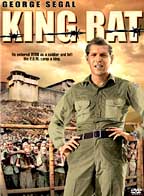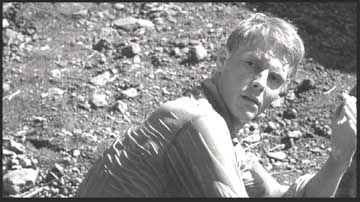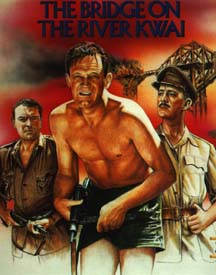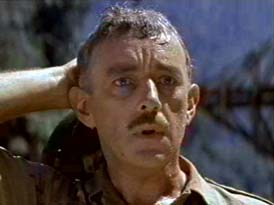Who is the blogger?
Archived entry
The Bridge On the River Kwai (1957) & King Rat (1965)
The War Within
Saturday Night At the Movies on TVO brings us an interesting and entertaining character study. William Holden and Alec Guiness convincingly portray men at opposite poles caught in the rat trap of a Japanese P.O.W. camp situated in a remote jungle during WWII. "King Rat" deepens the study of the psychology of men pushed to the limit in a gripping account of human suffering and depravity.
This week on SNAM we were treated to two great films about life as a prisoner of war during the Second World War. It was yet another hot summer night. However, the heat was not too oppressive this time as I sat under my whirring ceiling fan sipping my tropical fruit juice and eating my ice cream at midnight . We had eaten barbecued hotdogs for supper.
 Although I might have been deprived of a hotdog bun and real ice cream because of my allergies, the deprivation was nothing compared to what the poor souls endured in the films. “King Rat” is unforgettable with its scene of the British officers tucking into a fine meal of rat in a tin can. Equally memorable are scenes of the King’s clan hidden away in a prison cell to wolf down the remains of a fellow prisoner’s pet dog and Peter Marlowe salivating over the offer of a freshly fried egg. Food, or the lack of it, was a pretty central event in “King Rat”.
Although I might have been deprived of a hotdog bun and real ice cream because of my allergies, the deprivation was nothing compared to what the poor souls endured in the films. “King Rat” is unforgettable with its scene of the British officers tucking into a fine meal of rat in a tin can. Equally memorable are scenes of the King’s clan hidden away in a prison cell to wolf down the remains of a fellow prisoner’s pet dog and Peter Marlowe salivating over the offer of a freshly fried egg. Food, or the lack of it, was a pretty central event in “King Rat”.
Physical deprivations of all kinds, loathsome disease and death, mental and physical torture in abundance, and moral excavations into the souls of men exposing their innermost parts – what a merry old time it was. It was enough to ruin a good bowl of ice cream!
Both films uncovered frightfully few heroes – none to be exact. One might expect that there would be some extravagant heroism to compensate for all of those dreary rat eating scenes. Instead, things continue pretty much in the same vein in which they start in “King Rat”; an ancient officer sitting unceremoniously on the outdoor latrine with his pants around his ankles, a vacant stare in his eyes.
 The closest thing we get to heroism is where Corporal King decides to buy overpriced drugs to save his man Marlowe’s gangrenous arm from amputation. Marlowe takes it as a gesture of friendship and is forever grateful. King is somewhat more ambiguous.
The closest thing we get to heroism is where Corporal King decides to buy overpriced drugs to save his man Marlowe’s gangrenous arm from amputation. Marlowe takes it as a gesture of friendship and is forever grateful. King is somewhat more ambiguous.
Although the two of them celebrate in an unfeigned dance of joy when they both realize that Marlowe’s arm has been saved, King later minimizes what happened. King doesn’t have friends. He runs the racket in the camp. He moves the pawns around the board, but he doesn’t have friends.
In a final scene after the camp’s liberation by allied soldiers, Marlowe runs after the departing truck to say goodbye to King. The rules have all changed. The Corporal is no longer the King of the camp. He is just one more anonymous soldier being trucked back to obscurity in civilian life without even the benefit of saying goodbye to the one guy who thought of him as a friend. You get the picture that instead of being liberated, King is being hauled off to start a life sentence as a nobody. I guess moral bankruptcy and its accompanying dehumanizing effects turn out to have not such a great payoff in this story.
One of the “difficulties”, if it can be called such, is that there is no contrasting character or storyline to King’s morally hollow vision of life. Under the extreme pressures of the P.O.W. camp, everyone, from the top officer to the lowliest private, is portrayed as participating in the dog-eat-dog social structure of the camp. Every man can be bought for a price; even Peter Marlowe who tries to be his own man and set his own terms according to his British upper class vision and values. Even Lieutenant Grey, the camp Provost Marshal who spends his days sniffing out injustices and infractions with the tenacity of a hunting hound, comes to realize that he has been living with a kind of self-delusion. It is true that Grey is not “on the take” as are so many others in the camp. However, as Peter Marlowe astutely points out, Lt. Grey has been subjugated by hatred. Marlowe maintains that it was Grey’s consuming hatred for King accompanied by the desire for revenge on a number of levels that kept the Lieutenant alive in the camp. Thus, even Grey,the supposedly virtuous man, the pillar of moral rectitude, is left looking rather small and squished up in the end. There are no heroes to be had here in Changi , Singapore according to the movie version of James Clavell’s novel. Any profoundly human trait that would make a man greater than his squalid circumstances is in short supply, even in shorter supply than the food in Changi.
 At one point Marlowe sits down with some British officers who invite him to play a game of cards. Marlowe is scheduled to have his arm amputated because of gangrene. In the conversation that ensues, the chaplain inadvertently mentions “having faith” in reference to the card play. Marlowe unleashes a bitter tirade against the vicar aimed at the Lord God Himself. Marlowe spits, “Faith! Don’t give me that old line of bull! What can God do about anything?” The chaplain replies quietly, “He can heal.” Marlowe continues to spew venom: “Well, it’s a good job He’s done in here . . . men dying of dysentery and blindness. . . . He couldn’t be bothered. Do you know what I think? I think God is a vicious, sadistic maniac! You can take your God and your precious faith. They’re both a stinking joke!” The officers remain silent. I suppose they feel ill-equipped to defend the Almighty in such circumstances. It is evident that the best that Marlowe can hope for is the speedy amputation of his arm in a matter of hours.
At one point Marlowe sits down with some British officers who invite him to play a game of cards. Marlowe is scheduled to have his arm amputated because of gangrene. In the conversation that ensues, the chaplain inadvertently mentions “having faith” in reference to the card play. Marlowe unleashes a bitter tirade against the vicar aimed at the Lord God Himself. Marlowe spits, “Faith! Don’t give me that old line of bull! What can God do about anything?” The chaplain replies quietly, “He can heal.” Marlowe continues to spew venom: “Well, it’s a good job He’s done in here . . . men dying of dysentery and blindness. . . . He couldn’t be bothered. Do you know what I think? I think God is a vicious, sadistic maniac! You can take your God and your precious faith. They’re both a stinking joke!” The officers remain silent. I suppose they feel ill-equipped to defend the Almighty in such circumstances. It is evident that the best that Marlowe can hope for is the speedy amputation of his arm in a matter of hours.
But then, a miracle of sorts does occur; a miracle engineered by an unlikely source, the conniving and calculating Corporal King. For motives that are surely mixed in with a healthy dose of self-interest, King makes a move and buys the drugs necessary to cure Marlowe’s infected arm. Corporal King is a rather small, squished up deity to be sure, but he is the only one that Peter Marlowe has. And he gets the job done. Marlowe lives on with his arm intact.
In this godforsaken hellhole, Fate is blind and the universe is a brutal and barren place for a bunch of humans scrabbling to hold on to survival. Civilization seems very far away.
 In “The Bridge over the River Kwai” we get a somewhat different view of men and civilization. Colonel Nicholson, the consummate British officer, played by the most excellent Alec Guinness engages in a very personal type of warfare with his opponent, Colonel Saito, played by the equally excellent Sessue Hayakawa. The battle of iron wills ends with Nicholson getting his chance to demonstrate the superiority not only of British engineering techniques in building the bridge, but also the general “superiority” of British civilization. Nicholson rallies the troops and builds the bridge to show that “Britons never, never, never will be slaves”.
In “The Bridge over the River Kwai” we get a somewhat different view of men and civilization. Colonel Nicholson, the consummate British officer, played by the most excellent Alec Guinness engages in a very personal type of warfare with his opponent, Colonel Saito, played by the equally excellent Sessue Hayakawa. The battle of iron wills ends with Nicholson getting his chance to demonstrate the superiority not only of British engineering techniques in building the bridge, but also the general “superiority” of British civilization. Nicholson rallies the troops and builds the bridge to show that “Britons never, never, never will be slaves”.
It is all so appealing, so entertaining this myth about the heroic warrior who brings about victory in the middle of defeat by the sheer virtue of his own will and character. The audience gets swept along with the story of Nicholson’s heroism. It is easy to minimize those nagging doubting voices just as Colonel Nicholson does. The voice of the doctor, Major Clipton, who dares to suggest that the bridge building project might just possibly be viewed as treasonous by the British, is ignored. What utter poppycock and nonsense! The colonel remains blissfully blind to this reality until the final sequences of the film. It just does not fit in with his vision of the world. It never occurs to him to see things any other way. Clipton also gives voice to a primary commentary of the film, namely that war is insanity no matter how sane, rational and “right” the participants claim to be.
 The other dissident is, of course, the American, Shears. Shears is played very ably by William Holden. Shears is determined to survive the war any way he can, utilizing whatever Yankee ingenuity he can muster up. Morals and virtues are something he holds onto very lightly, to be jettisoned at the first moment of inconvenience in his personal battle for survival. Shears sees an opportunity and grabs hold of it, hoping that it will take him to a better place than where he is now. His general strategy in life much resembles his unpremeditated leap into the churning Kwai river during his escape from the camp. Shears is profoundly cynical. He sees men like Nicholson as dangerous lunatics putting many in harm’s way because of their misguided notions of honour, duty and suchlike.
The other dissident is, of course, the American, Shears. Shears is played very ably by William Holden. Shears is determined to survive the war any way he can, utilizing whatever Yankee ingenuity he can muster up. Morals and virtues are something he holds onto very lightly, to be jettisoned at the first moment of inconvenience in his personal battle for survival. Shears sees an opportunity and grabs hold of it, hoping that it will take him to a better place than where he is now. His general strategy in life much resembles his unpremeditated leap into the churning Kwai river during his escape from the camp. Shears is profoundly cynical. He sees men like Nicholson as dangerous lunatics putting many in harm’s way because of their misguided notions of honour, duty and suchlike.
Ironically, Shears miraculously escapes from the hands of one lunatic British commander, Nicholson, only to fall under the command of another, Major Warden. Against his will and his better judgement, Shears is talked into “volunteering” for a suicide mission to go back into the jungle and destroy the bridge. It all takes place in the most polite and apologetic manner possible over an oh-so-civilized serving of tea and crumpets. Before you know it, after the blackmail scene is over (Did I call it “volunteering”?), Shears finds himself swimming down the River Kwai to blow up the famous bridge so carefully constructed by Col. Nicholson and company. Shears becomes an inadvertent hero all over again as he dies trying to blow up the bridge. His luck has run out. This time it is the British officer, Warden who limps out of the jungle to life, liberty and a hero’s welcome.
 The utter futility of war and the insanity of national and personal pride are underscored by the final event of the bridge being blown up by none other than Colonel Nicholson himself. Nothing happens as it should. Stuff happens, but none of it ultimately makes any sense. It’s just a crazy juxtaposition of blind Fate and people like Saito and Nicholson who delude themselves into thinking that they are in control. People like Dr. Clipton are left on the sidelines after the cataclysmic events to pick up the pieces and muddle on through life.
The utter futility of war and the insanity of national and personal pride are underscored by the final event of the bridge being blown up by none other than Colonel Nicholson himself. Nothing happens as it should. Stuff happens, but none of it ultimately makes any sense. It’s just a crazy juxtaposition of blind Fate and people like Saito and Nicholson who delude themselves into thinking that they are in control. People like Dr. Clipton are left on the sidelines after the cataclysmic events to pick up the pieces and muddle on through life.
But, oh, what a grand adventure it was to go creeping up the River Kwai with the commandoes and what a spectacle it was to see that bridge and the train come crashing down!
In the newspaper this week there was an article written in commemoration of the surrender of Japan and the end of WWII in the Pacific. It was written as a personal memoir of a Japanese prison camp survivor. Aren Geisterfer was a teenager when the camps in Indonesia were finally liberated. Much as in these movies screened on TVO, the end of the war came as a surprise for the prisoners, an event met with elation, confusion and bitterness. One of Aren’s good friends in the camp died just before the liberation, as did his saintly Christian mother who was in a nearby camp. Aren was left a confused and embittered 14 year-old: “How could God let such terrible and unfair things happen? Where was He when it really mattered?” It was a real story told by a real prisoner of war who encountered real pain and suffering.
I remember other real stories that I have heard about other real people who lived and died in P.O.W. camps during the Second World War. Pain, suffering, and inhumanity were all present in abundance in their stories. But once in a while there was something else that was present that we didn’t see in the two selected movies. Once in a while there would be someone who was a real hero; not just a temporary put-up job like Shear’s heroism, but a real, unaffected heroism that came out of who those people actually were when no one was looking. Some of those people were Christians.
I think of Dietrich Bonhoeffer, a Lutheran pastor, theologian, and teacher who was executed by the Nazis a matter of days before Allied troops reached the camp where he was being held. Bohnoeffer was incarcerated for association with a failed attempt to assasinate Hitler. I think of a priest who willingly took the place of a guilty man executed for some petty crime in a German prison camp so that the man could live on and take care of his family. I think of Corrie ten Boon, a middle-aged Christian Dutch lady, who was dragged off to a prison camp for hiding Jews in her attic. I remember being impressed with her story when I was younger and saw a movie about her life. Before her sister, Betsie, dies in the prison camp, Corrie says to her, “Listen to me, Betsie! When we tell people that God is there, even in the worst of times, they will believe us because we have been there. We have lived in the hell of this prison camp and we still found God there. They will have to believe us.” And many people did believe Corrie after the war was over as she travelled the world with a message of love, forgiveness, hope and reconciliation.
Genuine heroes might not grow on trees in this or any other age, but they do exist. Thank God, they do exist.
Suggested Reading :
- Did you know that they trashed a real train on the “Bridge over the River Kwai”? IMDb trivia.
- Keep your eye on the fat middle-aged Dutch lady: the true story on film of Corrie ten Boom's wartime heroism.
- Where is God when evil and suffering make life “insanity”?
- Why is the evidence for God so elusive and confusing?
- Who's calling the shots around your place? Who's directing your life?
Posted on Thursday, March 8, 2007 at 09:40AM by ![]() Catherine Savard |
Catherine Savard | ![]() Post a Comment
Post a Comment



